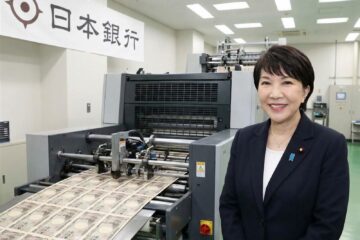United States
Disappointing earnings from Apple and Amazon heavily weighed on the Nasdaq, falling 1.3%. Positive surprises from large companies, such as Procter & Gamble, helped to offset some disappointments in the tech sector, resulting in the S&P 500 falling 0.7%. So far, the earnings seemed solid, as this is the first quarter with positive earnings growth since 2014. However, the high stock market valuation leaves little room to reward companies meeting and beating expectations, while those reporting poor results are heavily penalized.
The VIX finished the week at 16.19, thus increasing 22% during the week.
The flash manufacturing and service PMIs for the US companies were released this week, both beating analysts’ expectations and revealing an economic expansion. Moreover, on Friday, encouraging GDP data were released, showing the US economy expanded in the third quarter by 2.9%, the highest result since 2014.
These numbers seem not to deter Fed from sticking to its plan and the Fed funds futures are pricing a 74% probability of a rate hike in December. Positive economic data brought selling pressure in the US bond market after last week’s price gain. The benchmark yield of 10-year US Treasury grew from 1.76% to 1.84% during the week.
Next week, the Fed will hold its November meeting, deciding whether to raise interest rates or keep them on hold until December. Additionally, October job report will be released on Friday.
European Union
Good news came from the European periphery, particularly for the troubled banking sector. On October 23rd, the Spanish People’s Party leader Mariano Rajoy came to power (10 months after the first round of elections). The IBEX 35 index rallied more than 1.20% on the news and is up 4.94% from October 14th. The banking sector moved even more abruptly: over the last two weeks BBVA is up 15.61%, Banco Santander 13% and Caixa Bank 14.58%.
With regards to Italy, Banca Monte dei Paschi’s management reassured investors about the capital raise plan and declared the target of 1€ billion profits by 2019. In addition, rumors were spread about the interest of Kuwait, Qatar and Abu Dhabi’s sovereign funds towards the 5€ billion capital increase plan. The shares rallied as much as 105.88% (from 0.17€ to 0.35€) from October 17th-October 25th because many short positions were closed. The FTSE MIB Index is up 4.17% in the last two weeks.
Overall, the Eurostoxx Banks Index is up 10.42% over the last two weeks.
October has been the worst month for German bonds since 2013, with the yield on the benchmark 10-year bond climbing 30 basis points since the end of September.
The EURUSD traded below $1.09, out of the $1.095-$1.336 horizontal trendline which characterized the whole third quarter, for almost the whole week before rallying to 1.0985 on Friday close due to the new FBI investigation on Clinton. The fall was caused by the wide expectations of a Fed rate hike in December and a continuation of the QE program over March 2017 as the inflation target is still to be reached.
UK
FTSE 100 has risen nearly 11% since the day before the Brexit referendum. Many factors contributed to this (such as the oil rally, central bank stimulus and deferred consumption due to uncertainty), but the pound’s slump has done most of the work. Currently FTSE 100 is at 6968, which represents a fall of 0.3% during the week.
UK 10-year Gilt stands at 1.26%, which is 17bp higher than on Monday. GBPUSD is at 1.2185 (43bp weekly fall), while GBPEUR is at 1.1119 (1.13% weekly fall).
UK Q3 GDP growth was 0.5%, beating expectations of 0.3%. This growth was boosted by the service industries, while construction and production were a drag on quarterly growth. Inflation is at 1%, which represents the highest level in almost 2 years. Moreover, mortgage approvals by high street banks increased in September after reaching a 19-month low in August. In August a 21% decrease led to the lowest level since January 2015. Although September level is 15% lower YoY, that still represents an improvement comparing to August.
Nicola Sturgeon (First Minister of Scotland) stated that Scotland should remain in the single market, even if England and Wales opt for a hard Brexit deal. Their argument is that they, as a country, voted remain. However, Theresa May refused this flexible Brexit, and said that UK is getting only one deal (not two-tier).
Rest of the World
OPEC officials met on Friday in Vienna to have technical talks aimed at discussing all the scenarios, output quotas, and the implications on oil prices. However, they failed to reach agreement, amid objections by Iran which has been reluctant to freeze its output.
According to the primary numbers OPEC is producing above 33 million barrels a day and the agreement in Algeria says that OPEC has to maintain a ceiling of 32.5 to 33 million barrels. The High-Level Committee of experts (comprised mainly of OPEC governors and national representatives who report to their respective ministers) will meet again in Vienna on November 25th ahead of the next meeting of OPEC ministers on November 30th, to finalise individual quotas.
Regarding Asian equities, on Friday, the MSCI Asia Pacific Index decreased by 70 basis points. However, as the yen dropped to a three-month low against the dollar, boosting exports, the Japan’s Topix index increased by 80 basis points.
Chinese Manufacturing PMI will be released on the 1st of November and it has been forecasted to stay at the same level (50.4). In addition, some analysts at Bloomberg developed an indicator called Chinese Trade Partner PMI, which collects manufacturing data from China’s big export regions and it is put together in a trade-weighted basket. This gives an early read on how Chinese’ s manufactures will do. As the PMI lies nicely with the Chinese export orders, and there are some signals of strengthening from China’s export partners, they concluded that the growth momentum is “resilient”.
[edmc id= 4217]Download as PDF[/edmc]



0 Comments